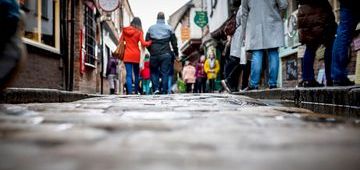Can you tell us what your role is and where you work?
I actually have two roles at the moment! I work for NHS Fife as a Contact Tracing Practitioner where I’m responsible for helping to identify and follow up on cases of Covid-19 and work out where outbreaks have occurred. I also work as a Podiatrist in a local clinic where I am working towards getting enough hours of practice under my belt to allow me to return to the Health and Care Professions Council (HCPC) register which governs all the Allied Health Professions (AHPs). I left the HCPC register and Podiatry Practice a few years back to enable me to focus on my PhD and family life.
Can you give us an overview of your career path?
I trained as a Podiatrist at the Birmingham School of Podiatry, Aston University and loved it from the second I started my course. My role as a qualified Podiatrist involved treating patients with foot (lower limb) problems and raising the profile of foot health within the community. Immediately after graduating, I completed a Master’s in Public Health (MPH) at Warwick Medical School in Coventry whilst working part-time in a private podiatry practice.
I then moved to Scotland where I continued to practice Podiatry, but I also became interested in learning how to enact health policy changes. I felt that I could help more than just one person at a time but wasn’t sure how. I started to learn more about public health policy through a research role into falls in elderly patients at my local NHS podiatry clinic in 2011 and afterwards I decided to do an MSc in Research in Public Health Policy at the University of Edinburgh.
I enjoyed the course at Edinburgh and it helped me to develop my understanding of public health policy, something I am really passionate about. I then went on to do a PhD at the University of Durham where I looked at the language of policy, focusing in particular on the Scotland Alcohol MUP policy debates and how effective policies are in addressing alcohol misuse.
What does a typical workday look like for you?
Currently, I work from home with my contact tracing role. I am assigned a case or a primary contact to follow up by a team lead. I get in touch with the case, complete the interview and provide self-isolation advice and support. During the interview, I note down a list of their contacts and then follow up with them, advising them about self-isolation and getting tested. Depending on the information gathered during the interview, I liaise with the environmental health officers and report settings visited by the case during their infectious period, and infection control and occupational health if the case is a health care practitioner who worked during their infectious period. We also have a schools list that is regularly updated and fed back to the Health Protection Team (HPT) to ensure the school/class contacts are advised to self-isolate. We’ll often have team meetings to talk about our cases and challenges, and to identify any ‘hot spot’ areas where there have been lots of cases.
I also work as a Podiatrist in a private practice where I am working towards getting the hours needed to re-join the HCPC register. I have a mentor at the practice who helps expose me to as many patients and clinical presentations as possible.
What areas of public health are you the most passionate about?
I’m passionate about raising the profile of podiatry and I’m currently working on a project with support from the College of Podiatry to help engage more people with their foot health. I’m working to fashion a public health specialist role that combines my public health and podiatry expertise. It would allow me to play an active role in encouraging young people to take care of their feet and teach them about what a career as a Podiatrist entails. Part of the role would mean going into schools to give talks to students, teachers and carers to implement the education about foot health. It’s such an important but often overlooked area of health: we rely on our feet to carry us everywhere we go, yet most people will never learn how to properly take care of them.
How did you find out about The Royal Society for Public Health?
I listened to a talk where someone from the Allied Health Professions was talking about the Royal Society for Public Health. She mentioned the AHP Facebook group which I then joined, and consequently I found out more about the organisation from there. I thought it would be beneficial for my career if I could get regular access to CPD opportunities and would be a great opportunity to learn from other public health professionals.
What have you enjoyed most about being an RSPH member?
I really like taking part in webinars and events which help me work towards my CPD – for example, I’m going to a conference on Food Fraud next week. I also like finding out about developments in public health and learning more about the sector from things like newsletters.
And finally, how do you take care of your own health and wellbeing?
I really like being active – I’m lucky that I have a job where I’m on my feet (for the days I am at the podiatry clinic) and I go for a walk most mornings with my son. I also make sure I catch up regularly with my family and friends and find time to relax in the evenings by watching a comedy film, listening to music, or meditating.



